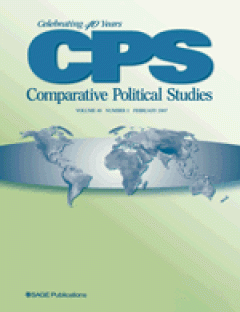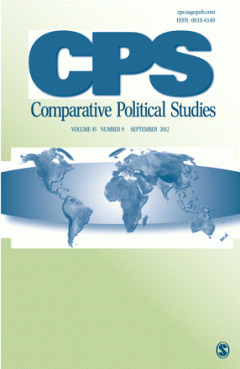Filter by

Notionally Defined Contributions or Private Accounts in Eastern Europe : A Re…
This article is concerned with what determines a government’s choice of pension reform. It starts from an argument by Myles and Pierson that claims that the newer pension systems are able to privatize whereas the older, matured systems faced with the double payment problem tend to adopt notional defined contributions (NDC) accounts. This argument is retested with in-depth qualitative analysis o…
- Edition
- Vol. 44 no. 7, July 2011.pp. 884-909
- ISBN/ISSN
- 00104140
- Collation
- -
- Series Title
- Comparative Political Studies
- Call Number
- -

Constrain-Thy-Neighbor Effects as a Determinant of Transnational Interest Gro…
Why does the willingness of interest groups to join forces with their peers abroad vary across issues? The present article points to cross-issue variation in the “constrain-thy-neighbor” effects of transnational law. Interest groups consider not only whether they are worse off if they themselves are subjected to a transnational law. They also consider how it affects them if the same law applies…
- Edition
- Vol. 44 no. 7, July 2011.pp. 910-931
- ISBN/ISSN
- 00104140
- Collation
- -
- Series Title
- Comparative Political Studies
- Call Number
- -

Comparative Studies of Policy Dynamics
Major new understandings of policy change are emerging from a program to measure attention to policies across nations using the same instrument. Participants in this special issue have created new indicators of government activities in 11 countries over several decades. Each database is comprehensive in that it includes information about every activity of its type (e.g., laws, bills, parliament…
- Edition
- Vol. 44 no. 8, August 2011.pp. 947-972
- ISBN/ISSN
- 00104140
- Collation
- -
- Series Title
- Comparative Political Studies
- Call Number
- -

Comparing Government Agendas : Executive Speeches in the Netherlands, United …
At the beginning of each parliamentary session, almost all European governments give a speech in which they present the government’s policy priorities and legislative agenda for the year ahead. Despite the body of literature on governments in European parliamentary democracies, systematic research on these executive policy agendas is surprisingly limited. In this article the authors study the e…
- Edition
- Vol. 44 no. 8, August 2011.pp. 973-1000
- ISBN/ISSN
- 00104140
- Collation
- -
- Series Title
- Comparative Political Studies
- Call Number
- -

Effects of the Core Functions of Government on the Diversity of Executive Age…
The distribution of attention across issues is of fundamental importance to the political agenda and outputs of government. This article presents an issue-based theory of the diversity of governing agendas where the core functions of government—defense, international affairs, the economy, government operations, and the rule of law—are prioritized ahead of all other issues. It undertakes compara…
- Edition
- Vol. 44 no. 8, August 2011.pp. 1001-1030
- ISBN/ISSN
- 00104140
- Collation
- -
- Series Title
- Comparative Political Studies
- Call Number
- -

Content Matters : The Dynamics of Parliamentary Questioning in Belgium and De…
Why do MPs devote attention to some issues while ignoring others? The question of the issue content of parliamentary activities has been neglected in previous research. The authors use longitudinal data on parliamentary questioning in Belgium and Denmark, two similar European democracies. The analyses show that the questioning behavior of MPs is structured according to clear patterns. Oppositio…
- Edition
- Vol. 44 no. 8, August 2011.pp. 1031-1059
- ISBN/ISSN
- 00104140
- Collation
- -
- Series Title
- Comparative Political Studies
- Call Number
- -

Reduction, Stasis, and Expansion of Budgets in Advanced Democracies
This article investigates changes within national budget by examining actors’ behavioral predilections and the institutional constraints under which they operate. The article presents three theoretical propositions about the influence of attention and institutions on all magnitudes of programmatic budget changes ranging from large cuts to massive expansions. Using quantile regression, the autho…
- Edition
- Vol. 44 no. 8, August 2011.pp. 1060-1088
- ISBN/ISSN
- 00104140
- Collation
- -
- Series Title
- Comparative Political Studies
- Call Number
- -

Comparing Law-Making Activities in a Quasi-Federal System of Government The …
In this article the authors develop a new approach to the study of policy dynamics in a quasi-federal system of government. The goal is to contribute to previous research on comparative federalism by analyzing the variations of issue attention between levels of government and across four regional governments—Andalusia, Catalonia, Galicia, and the Basque Country. To do so the authors follow the …
- Edition
- Vol. 44 no. 8, August 2011 .pp. 1089-1119
- ISBN/ISSN
- 00104140
- Collation
- -
- Series Title
- Comparative Political Studies
- Call Number
- -

Why new parties?
The variables explaining party system fragmentation have been investigated extensively, but little is known about changes in the number of parties over time within countries. This article is an attempt to fill the gap by explaining the entry of new viable competitors in party systems after the founding election. Using empirical evidence from Spain, we show that when there is an electoral market…
- Edition
- Vol. 17 no. 1, January 2011.pp. 3-20
- ISBN/ISSN
- 13540688
- Collation
- -
- Series Title
- Party Politics
- Call Number
- -

Is the party over? The decline of party activism and membership across the de…
The decline of party activism and membership in European democracies has been well documented, but not effectively explained. This article examines the state of party membership and activism across a wide spectrum of democratic countries and shows that membership is in decline in most of them. It tests two rival explanations of the decline using a cross-sectional multi-level analysis of data fr…
- Edition
- Vol. 17 no. 1, January 2011.pp.21-44
- ISBN/ISSN
- 13540688
- Collation
- -
- Series Title
- Party Politics
- Call Number
- -

For want of a nail : Negative persuasion in a party leadership race
Should party leadership candidates communicate their policy positions to the party’s electorate? And should they do so when their own ideal position is outside their party’s mainstream? This article presents evidence from a field experiment into the communication of controversial policy positions through direct mail. Working with a front-running campaign during the race for the leadership of th…
- Edition
- Vol. 17 no. 1, January 2011.pp. 45-65
- ISBN/ISSN
- 13540688
- Collation
- -
- Series Title
- Party Politics
- Call Number
- -

Women, parties and platforms in post-industrial democracies
Will women transform party politics? As a group of relative newcomers to parties, women may contribute to shaping parties’ policy agendas and to changing party rules. A party-level perspective allows for examination of the national- and party-level contextual influences that condition the effect of women on party platforms. Systematic analysis of a broad range of 142 political parties in 24 pos…
- Edition
- Vol. 17 no. 1, January 2011.pp. 66-92
- ISBN/ISSN
- 13540688
- Collation
- -
- Series Title
- Party Politics
- Call Number
- -

Turnout and the (effective) number of parties at the national and district le…
Blais (2006) and Blais and Aarts (2006) in their review essays on voter turnout call attention to a striking puzzle about the link between electoral systems and turnout, namely that, ceteris paribus, proportional representation (PR) systems with many parties appear to have higher national-level turnout than single-member district (SMD) plurality systems with few parties, yet turnout does not in…
- Edition
- Vol. 17 no. 1, January 2011.pp. 93-117
- ISBN/ISSN
- 13540688
- Collation
- -
- Series Title
- Party Politics
- Call Number
- -

Social democrats, unions and corporatism : Denmark and Sweden compared
A number of recent studies have documented weakening ties between social democratic parties and trade unions. This article is concerned with the effects of weakening party— union ties on policymaking. In many classic studies of corporatism it has been argued that this mode of policymaking depends on strong ties between social democratic parties and trade unions. In this article, we argue, in co…
- Edition
- Vol. 17 no. 1, January 2011 .pp. 118-134
- ISBN/ISSN
- 13540688
- Collation
- -
- Series Title
- Party Politics
- Call Number
- -

Outsider parties in government in Western Europe
Over the past two decades, a growing number of ‘outsider parties’ have entered governing centre-left and centre-right coalitions across Western Europe. In this introduction, we first define outsider parties as those which — even when their vote-share would have enabled it — have gone through a period of not being ‘coalitionable’, whether of their own volition or that of other parties in the sys…
- Edition
- Vol. 17 no. 4, July 2011.pp.443-452
- ISBN/ISSN
- 13540688
- Collation
- -
- Series Title
- Party Politics
- Call Number
- -

Of goals and own goals : A case study of right-wing populist party strategy f…
Using internal party documents and semi-structured interviews with over 200 activists of the Freedom Party of Austria, this article examines (anticipatory) adaptation in the intra-party and governmental arenas when this right-wing populist party switched its primary goal from populist vote maximization to office. It suggests such parties’ success will owe much to their leaderships’ capacity to …
- Edition
- Vol. 17 no. 4, July 2011.pp. 453-470
- ISBN/ISSN
- 13540688
- Collation
- -
- Series Title
- Party Politics
- Call Number
- -

Di lotta e di governo : The Lega Nord and Rifondazione Comunista in office
Since 1994, Italian politics has seen a number of coalitions including parties whose identity has been strongly based on their ‘outsider’ status as uncompromising opposition movements which would not previously consider government participation. This article examines the contrasting experiences in office of two such parties: the regionalist populist Lega Nord (LN) and the radical left Rifondazi…
- Edition
- Vol. 17 no. 4, July 2011.pp. 471-487
- ISBN/ISSN
- 13540688
- Collation
- -
- Series Title
- Party Politics
- Call Number
- -

The radical left in coalition government : Towards a comparative measurement …
This article raises questions about how best to assess the performance of radical left parties participating in coalition governments. Drawing in part on interviews (see Appendix 1), it covers parties that have participated in coalition government (Cyprus, Finland, France, Ireland, Italy, Norway), or have acted as ‘support parties’ (Denmark, Sweden), or are debating the ‘pros and cons’ of coali…
- Edition
- Vol. 17 no. 4, July 2011.pp. 488-504
- ISBN/ISSN
- 13540688
- Collation
- -
- Series Title
- Party Politics
- Call Number
- -

From protest to power : Autonomist parties in government
In many Western European states, an increasing number of autonomist parties are taking part in government at state and regional levels. To date, however, scholars have paid little attention to the repercussions of government incumbency for these actors. This article aims to take a first step towards redressing this oversight. Based on an extensive literature examining political parties in gover…
- Edition
- Vol. 17 no. 4, July 2011.pp. 505-524
- ISBN/ISSN
- 13540688
- Collation
- -
- Series Title
- Party Politics
- Call Number
- -

Party system classification : A methodological inquiry
Despite the recent spread of multi-scale approaches to party system classification, the most widely accepted criterion has always been the number of parties, often defined in terms of their relative sizes. Building on the existing body of qualitative classifications and quantitative techniques, this article proposes a method that can be used for defining party system types in operational terms,…
- Edition
- Vol. 17 no. 5, September 2011.pp. 539-560
- ISBN/ISSN
- 13540688
- Collation
- -
- Series Title
- Party Politics
- Call Number
- -
 Computer Science, Information & General Works
Computer Science, Information & General Works  Philosophy & Psychology
Philosophy & Psychology  Religion
Religion  Social Sciences
Social Sciences  Language
Language  Pure Science
Pure Science  Applied Sciences
Applied Sciences  Art & Recreation
Art & Recreation  Literature
Literature  History & Geography
History & Geography